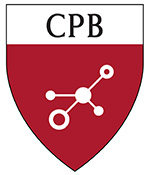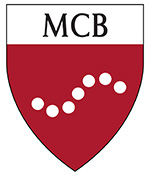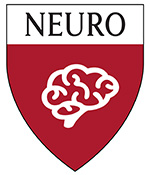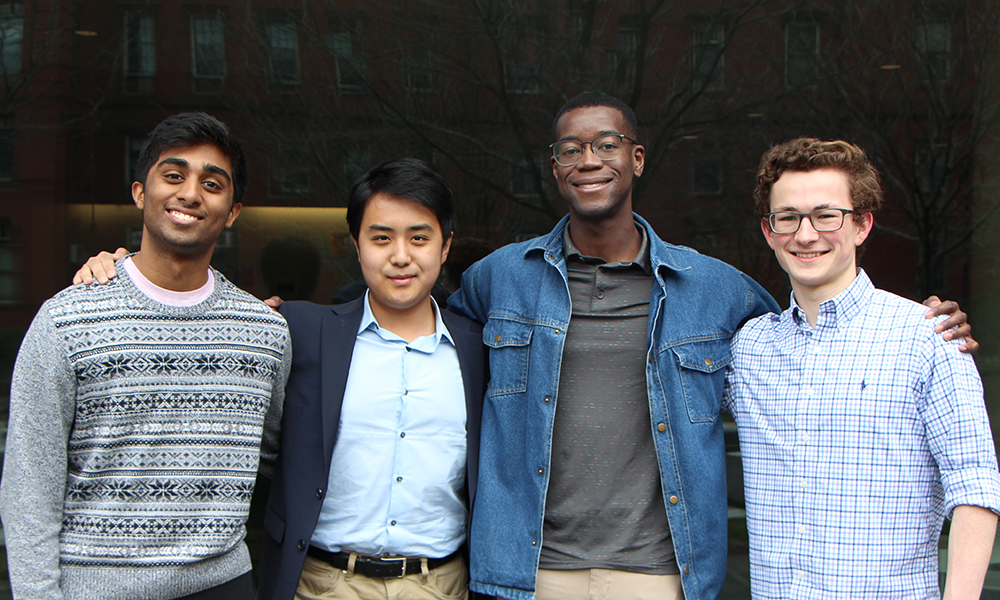Each spring, the Phi Beta Kappa (PBK) honor society selects 24 extraordinarily accomplished juniors to join its ranks. Established in 1779, Harvard’s PBK chapter is one of the oldest and most prestigious academic honor societies in the country.
This year’s “Junior 24” includes four undergraduates from concentrations administered by the MCB department: Alexander Chen (Neuroscience & Chemistry), Srihari Ganesh (CPB & Mathematics), Clarence Ndubisi (MCB), and Will Nickols (CPB & Statistics). Read on to learn more about these exceptional students.

Alexander Chen (Neuroscience & Chemistry with a Secondary in Computer Science)
Neuroscience and Chemistry concentrator Alexander Chen would like to use neurobiology insights to inform clinical mental health treatment, as well as the intersections between psychology and public health.
He is enthusiastic about his election to PBK, saying, “I am undoubtedly honored to have been elected to Phi Beta Kappa and deeply appreciate the recognition, especially given the storied history of the society.”
Chen says that his Harvard coursework has often reinforced the interdisciplinary nature of his academic interests. “Harvard boasts an excellent neuroscience program, and being a neuroscience concentrator on the Mind, Brain, and Behavior track has given me the flexibility to take courses both pertaining to molecular neurobiology and the rapid advances within the field over the past few decades as well as courses that are adjacent to neuroscience in some manner,” he says. “For instance, taking classes such as MCB 80 and MCB 125 have allowed me to get a concrete sense of the tools at our disposal to systematically probe everything from the diversity of human emotions to the essence of consciousness, while taking electives such as natural language semantics and developmental psychopathology has helped me reconcile the basic science principles I learn in my core classes with my interests in related fields.”
Research will be a priority for Chen in the coming year. This summer, he will travel to Singapore to study childhood neurodevelopment at the Singapore Institute for Clinical Sciences. After that, he will be in Papua New Guinea recording Tok Pisin speakers for a linguistics project. When he returns to Cambridge in the fall, Chen will be conducting senior thesis research in Erin Hecht’s lab, where he will investigate the neurobiology of domesticated foxes.
Chen adds,“Thank you to my family, friends, colleagues, mentors, and everyone else who has been of support on my academic journey!”
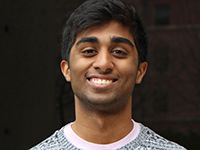
Srihari Ganesh (CPB & Mathematics with a concurrent Master’s in Statistics)
CPB and Mathematics concentrator Srihari Ganesh is excited to join PBK. “I am appreciative that the luck turned out in my favor, glad that the chapter thought my body of work was worthwhile, and aware of some new pressure to live up to the title,” he says.
Ganesh has been interested in chemistry and biology since high school, but his studies at Harvard have motivated him to become more involved in mathematics and statistics.“Coming into college, I knew I wanted to study biology and chemistry, so CPB seemed like the best fit; MCB 60, Chem 20, and Chem 30 confirmed that notion and were awesome, challenging courses,’ he says. “I also got into statistics early: I took Stat 110 because a slot opened up in my freshman fall and it’s still my favorite class overall, though Stat 210 is now a close contender; the people of the Statistics department are also a big reason why I love the subject.”
“I’d like to acknowledge a few of the people who have helped me tremendously during my time here. Vlad Denic, Dominic Mao, Logan McCarty, and Andrew Myers hooked me into biology and chemistry in my introductory classes,” Ganesh says. “Joe Blitzstein (Stat 110/210) and Rachel Li and Ginnie Ma (co-founders of my favorite club, GUSH) welcomed me into the Statistics department with kindness and probability. Dusty Grundmeier and Joseph Jakubowski showed me some beautiful math and music, respectively. Raaz Dwivedi, Eura Choi, and Susan Murphy were really encouraging and validating during my first graduate class.”
He adds, “I’ve also been a course assistant in a variety of classes—organic chemistry, probability, and machine learning —and appreciate being given that opportunity by Joe Blitzstein, Logan McCarty, Andrew Myers, and Weiwei Pan. Obviously, my past research mentors have been vital: Aline Guse and Philippe Cluzel introduced me to scientific research in the Cluzel Lab during my first year, and Sam Berry, Han Spinner, and Debora Marks brought me into computational biology in the Marks Lab over the past year. I also appreciate my mom, dad, sister, and dog for putting up with me, as well as my friends both here and at home. Specifically for the PBK application, I want to thank Harini Kannan and Will Nickols for their help on my essays, Joe Blitzstein for always being a willing recommender, and Chris Kabacinski for answering questions about the process.”
Ganesh recently began protein structure research with Regina Barzilay and Tommi Jaakkola at MIT, where he is being mentored by Jason Yim. “I’m really interested in contributing to computational structural biology,” Ganesh says. “But I’m still figuring out what to do right after college — maybe grad school, a fellowship, or industry, wherever I’m best equipped to make an impact!”
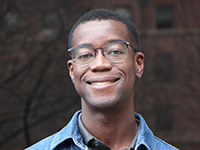
Clarence Ndubisi (MCB with a Secondary in Global Health and a concurrent Master’s in Chemistry)
MCB concentrator Clarence Ndubisi says joining PBK has been, in a word, “overwhelming.”
“It’s such an honor to be recognized for my work by being elected to PBK, especially at a school like Harvard where I interact with so many gifted students on a daily basis,” Ndubisi says. “I found out by randomly checking my emails in the middle of Chem 153. I celebrated by treating myself to a nap later in the day.”
Along with his MCB concentration, Ndubisi is pursuing a secondary in Global Health, a language citation in Spanish, and a concurrent Master’s in Chemistry. “My favorite classes at Harvard have been Chem 20, Spanish 80T, and HISTSCI 172 – Mental Health Matters,” he says. “I knew I wanted to study MCB since taking LS1a, as I enjoyed studying biological and biochemical processes.”
Ndubisi is in the pre-med track and plans to apply for medical schools next year. This summer, he will be working as an associate consulting intern at Bain & Company. He will also continue his biochemistry research in Amit Choudhary’s lab at the Broad Institute. In the long term, Ndubisi is interested in developing pharmaceuticals and therapeutics and believes that pursuing a Master’s degree in Chemistry will support that goal.
He adds, “I’d like to thank Professor Alain Viel for endorsing me for PBK, Professor Dominic Mao and the rest of the MCB team for all of their advice with my academic pursuits, and all of my past professors whose instruction has made my election into PBK possible, especially those whose courses I discussed in my application: Dr. Anne Harrington, Dr. Daniel Aguirre-Otezia, and Dr. Andrew Myers. I’d like to lastly thank my parents, my brother, and my sister for their constant love and support.”

Will Nickols (CPB & Statistics with a concurrent Master’s in Statistics)
CPB & Statistics concentrator Will Nickols arrived at Harvard with an interest in chemical and physical biology, statistics, and philosophy. He took a statistics class in his first semester and quickly became fascinated by biostatistics and computational biology.
“The CPB/Statistics joint concentration has been a fantastic way to pursue this interest,” Nickols says. “Giovanni Parmigiani‘s Stat 117 biostatistics class gave me the chance to invent and implement my own models for using gene expression data to predict breast cancer outcomes. Likewise, Sean Eddy‘s MCB 112 biological data analysis class provided a deeper understanding of the techniques and models I was using in my research for high-dimensional and non-parametric modeling. Outside of biostatistics, Joe Blitzstein’s Stat 110/111/210 core has supplied a phenomenal theoretical statistics framework for building new inferential methods. Additionally, Bernhard Nickel‘s Phil 3 epistemology, ethics, and personal identity class helped contextualize many of the philosophical debates I had with friends in high school, the conversations we have each week in the Harvard Salon, and the work I’m doing with Harvard’s Effective Altruism group.”
He adds that his election to PBK came as a bit of a shock. “There are so many extremely smart people I know here who excel in their classes and who are much more prolific researchers and publishers than I am, so I was genuinely surprised they chose me as one of the twenty-four,” Nickols says. “Simultaneously, I was extremely grateful to all the people who helped me get to this point: Kevin Rader in the statistics department for letting me help teach Stat 139 and for writing my PBK letter of recommendation, Joe Blitzstein in the statistics department and Bernhard Nickel in the philosophy department for teaching the fascinating classes that I wrote about in my PBK essays, Curtis Huttenhower and Kelsey Thompson in the biostatistics department for advising my research and providing me so much academic flexibility, my friends for all the fascinating conversations that have exposed me to new facts and perspectives on the world, and my family for all their love and encouragement from a very young age.”
Nickols plans to spend the summer conducting research in Kai Zhou’s lab at the Buck Institute before returning to work on senior thesis research in Curtis Huttenhower’s lab at HSPH in the fall. He also plans to apply to biostatistics graduate programs next year.
“It’s easier to say on the other side, but I would encourage people to take the most challenging classes they think they can handle,” he adds. “I think people surprise themselves with their abilities to rise to the occasion, and you’ll likely learn much more by doing something challenging even if you don’t fully understand everything in the class. Second, especially for freshmen and sophomores, I highly encourage applying to HSURV even if you’re only remotely interested in research. You’ll be around a tremendously motivated group of peers, and the ethos of problem-solving and creativity is infectious in a fantastic way.”
Congratulations to these four PBK electees!


